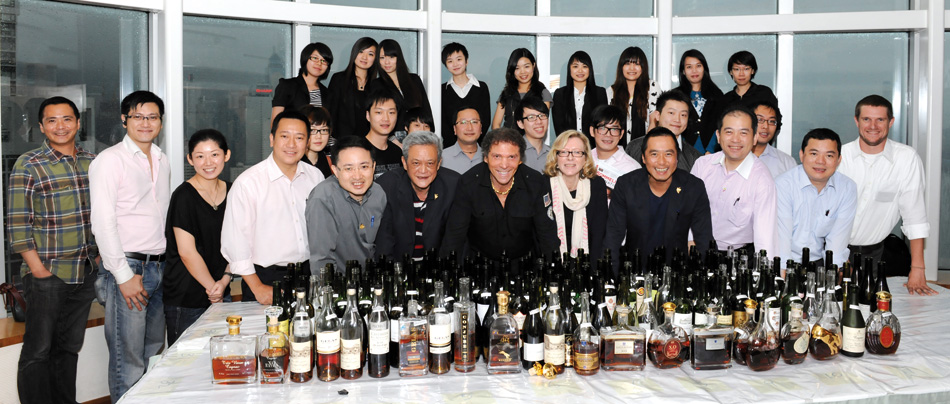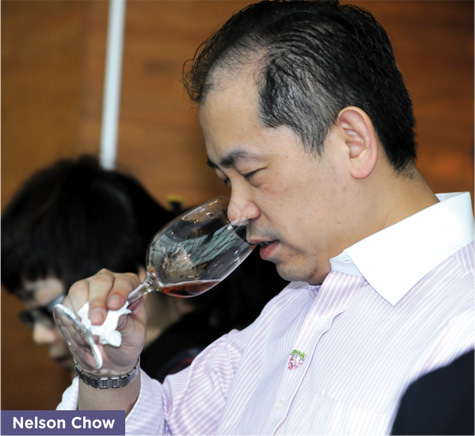Contest Hong Kong
HONG KONG SOMMELIER ASSOCIATION
French Wine Challenge 2011
 The global wine market has expanded dramatically over the last two decades creating a greater demand for wines and thus putting more emphasis on the value and importance of today’s working professional sommeliers.
The global wine market has expanded dramatically over the last two decades creating a greater demand for wines and thus putting more emphasis on the value and importance of today’s working professional sommeliers.
No more can this statement be seen to be true than in South East Asia with the emergence (and some might argue subsequent dominance) of new markets such as Greater China, including Hong Kong.
The scrapping of import duties in 2008 by the Hong Kong Government (wine was taxed at 40 per cent prior to this date) opened the door to a wealth of wineries to sell their wine in Hong Kong and this has kick started the Asian interest in wine and has shifted Hong Kong from a maturing emerging market to a world leader in wine interest, consumption and sales.
To prove this point, on a recent trip to Hong Kong, CEO of China’s largest wine importer ASC Fine Wines Don St. Pierre Jnr., noted that.
“It is a remarkable achievement that Hong Kong is now the leader in fine wine sales around the world”. Robert M. Parker Jnr. says of ASC Fine Wines that they are,
“China’s greatest fine wine importer”.The popularity of wine in Hong Kong for both immediate consumption and investment has brought the need for a more skilled and knowledgeable local work force and no-one is doing more to enhance the capabilities of sommeliers, and junior wine servers alike, than the Hong Kong Sommelier Association (HKSA).
The HKSA was formed in 1989 by a group of professional wine service personnel with the aim of sharing information on wines and spirits through informative wine courses, tutored wine classes, winemaker visits and tastings. In their 22 years of existence the HKSA has received honorable recognition from the Association de la Sommellerie Internationale (ASI), and has established an extensive network of professionals in both Hong Kong and China.

HKSA Chairman Nelson Chow points out that the key to a successful wine trade starts with the people involved in the business. Servers, sommeliers, managers and tradespeople all need training to develop the skills required to confidently work within the wine trade. Education is the key and the HKSA started its own sommelier accreditation system and annually publishes the local Sommelier Register.
Mr. Chow is quick to point out that the HKSA is a nonprofit organization and thus it thrives on the support of the local wine trade and industry professionals alike.
In April this year, the HKSA hosted its annual Best French Wine & Spirit Challenge for Asia over two days in Hotel In Tin Hau, Hong Kong. The challenge was attended by some of Hong Kong’s top sommeliers from the local five star hotels, alongside numerous wine importers and trade professionals.
Janie Woo, director of import company Natural Econometric Hong Kong Limited, said that the challenge is an excellent way of determining the wines that best suit the local tastes and a great way for less experienced tasters to get to know the subtle differences in regional French wines.
French wines, especially those from Bordeaux, enjoy sustained market dominance in Hong Kong thanks, in part, to the worldwide popularity in Bordeaux Growths for investment. The idea of terroir appeals greatly to the local Chinese market and this terroir dominated palate found in most regional French wines is what suits the tastes of the local market. None more is this highlighted than by the bi-annual Vinexpo exhibition held in Hong Kong in the years it’s not held in Bordeaux – in fact many local Chinese wine lovers find their way to Vinexpo Bordeaux on a regular basis.
The French Wine Challenge itself saw the regions of France broken down to make tasting and comparison easier. Done blind, the purpose of this tasting was to give tasters the opportunity to estimate every wine objectively and according to specific criteria. The tasting was broken down into the following categories:
- Bordeaux Superieur
- Selected Burgundy
- Refreshment with White
- The Famous Left Bank
- The Right Bank
- Champagne and Sparkling wine
- The rest of France separately (Languedoc, Loire, Southwest, Provence ...)
- Cognac and Armagnac
- Sweet / Dessert wines All in all, more than 257 wines and spirits were tasted during these two days, with an individual vote for every wine and the attribution of Platinum, Gold, Silver or Bronze medals. Wines and spirits of an exceptional quality received the Platinum Medal 1% of the medal-holders; 15% obtained a gold medal, 55% a silver medal and 29% a bronze medal, for a total of 157 rewarded wines, i.e. 60% of participating wines and spirits.
Wines were judged on appearance, colour, nose, palate (acidity, over-all taste and mouth feel) and the wines ageing potential. Last day of the challenge, all awarded wines were again blind-tasted, but this time by realizing alliances with typical dishes of the Asian cooking. The objective of this exercise was to confirm the ratings, because if it is important to find a good wine or a spirit, it is essential that it agrees perfectly with the local cuisine. This topic has been thoroughly discussed in the group and conclusions were drawn there and then.
Edwin Chan, vice Chairman of the HKSA noted.
“Appreciating wine is about the whole experience.” “Food and wine matching is the key nowadays to successful wine sales and implementation.” Mr. Chan added.


The morning of the first day was dedicated to the Bordeaux Superieur and the selected Burgundy.
In a time limit set by the Jury President Nelson Chow, tasters have analyzed, swirled, swallowed and spat out, and finally give their notes.
After a quick reset and a palate cleanse, tasters readied themselves for the Burgundy section of the challenge. Burgundy wines are notoriously difficult to judge due to the nature of their prestige and thus the hefty price tag that is often associated with them, but the quality of the presented samples returned this tasting easier than planned.
After lunch, it was the turn of the whites to enthuse the tasting panel. With a clear palate tasters embarked on tasting the white wines region after region.
“The Famous Left Bank” as it’s affectionately known in Hong Kong, was the following category to be investigated. It was a chance to get into some serious Bordeaux and the wines did not disappoint.
The day closed out with a tasting of some of the fantastic sweet wines France has to offer. A fitting end to an exhausting day during which medals, as highlighted by the increasing popularity of these wines in the Far East.
With the first days tasting over tasters departed for some rest and relaxation as day two would see and early start with a tasting of Champagnes and Sparkling wines.

Excitement was at fever pitch the morning of day two with the sound of popping champagne corks enough to motivate even the staunchest Sunday morning sleeper.
Forty six Champagnes and sparkling wines were the start to the day and as tasters got into the mood the tasting evoked discussion of how champagne and sparkling wine is certainly best tasted in the morning with fresh palates at the ready.
Quickly progressing, tasters indulged themselves with wines of the Right Bank.
It’s difficult to sum up the
“Rest of France” in a tasting of only fifty five bottles but it was nevertheless the case and tasters pushed on with the available selection. Wines were tasted in order of regions (the Loire, the Haut-Rhône, the Bas - Rhône, Provence, Southwest…) and many present sommeliers followed the order of tasting which seemed to them more logical..
The great tradition of Cognac consumption and the desire to discover the Armagnacs had made everyone very impatient since the day before, and I can confirm that the quality presented did not disappoint. In all, twenty six spirits were tasted as the day drew to a close and at this point some classic Chinese dishes were served in order to educate the present company more so on how to pair fine French spirits with local cuisine.

Armagnac Dartigalongue 1989 won a Platin medal. This Armagnac was made in the same year the HKSA was formed.
Overall, Mr. Chow noted that he found the quality of the wines tasted “of a very good level” and that he was “pleased with the quality wines coming from small Chateaux”. But he put heavy emphasis on the quality of the Champagnes this year of which he assures he is “very happy”. Mr. Chan concurred, saying that this year’s wines were “certainly very approachable”.
The future for French wines in Hong Kong looks to continue brightly. As more and more people become interested in wine it is up to the HKSA to inspire the next generation of wine drinkers. To do this Mr. Chow says that sommeliers and educators need to pass on their experience to the youth through tastings, lectures and, most importantly, through their own experiences with wine. There is a huge potential for increased sales of French wine in South East Asia as organizations such as the HKSA continue to educate the sommeliers of the future. With French wine sales increasing by 165% over the last five years, there is a need for an informative, educational sommelier association to heighten the interest and awareness in the quality wines coming from France. Wine is not only a lifestyle choice in terms of drinking and appreciating, it is a lifestyle for those involved in its promotion and education. This is exactly what the HKSA is here to do – and they are here to stay.
The Hong Kong Sommelier Association can be contacted through their website at
www.hksa.org
Alasdair Nicol
Ecrivain du vin
Hong Kong SAR, China 








